Analysing Training, Learning and Assessment in Hospitality Report
VerifiedAdded on 2021/01/02
|7
|1188
|153
Report
AI Summary
This report delves into the crucial aspects of training, learning, and assessment within the hospitality industry, particularly focusing on the development of receptionists. The report highlights that effective training programs are essential for equipping employees with the necessary skills to excel in this service-oriented sector. The report explores the training process, emphasizing the importance of teaching, learning, and assessment in enhancing employee capabilities. The report further examines the role and use of initial and diagnostic assessments in hospitality training, detailing how these assessments help identify training needs, strengths, and weaknesses of trainees. The initial assessment identifies the requirements of the job role, while the diagnostic assessment evaluates existing skills and knowledge. The report concludes that both assessments are essential for creating effective training programs that meet the specific needs of the employees and contribute to high productivity within the hospitality sector. It stresses the importance of soft skills, communication skills and grievance resolution skills for receptionists. The report also provides a comprehensive understanding of assessment methods and their significance in employee development and organizational success.
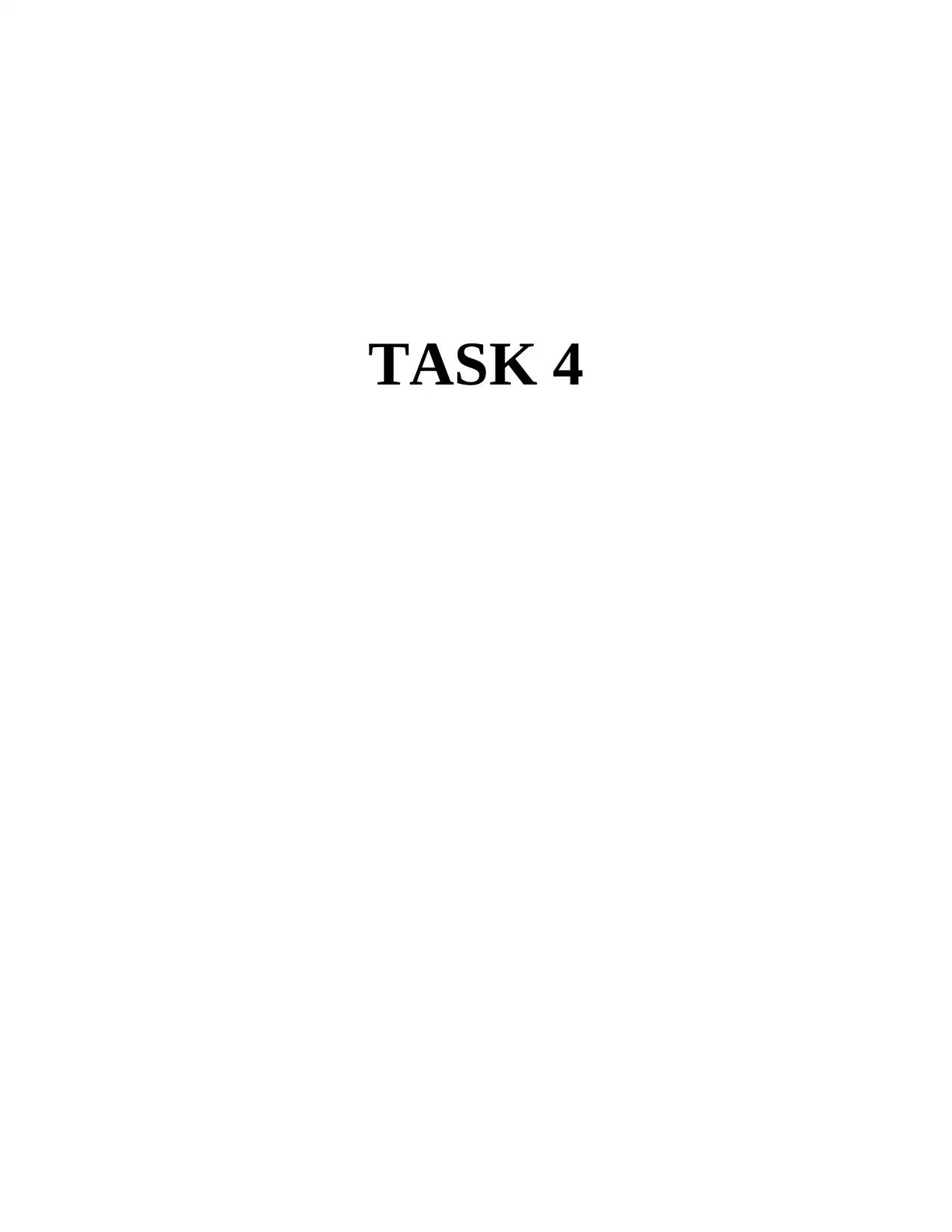
TASK 4
Paraphrase This Document
Need a fresh take? Get an instant paraphrase of this document with our AI Paraphraser
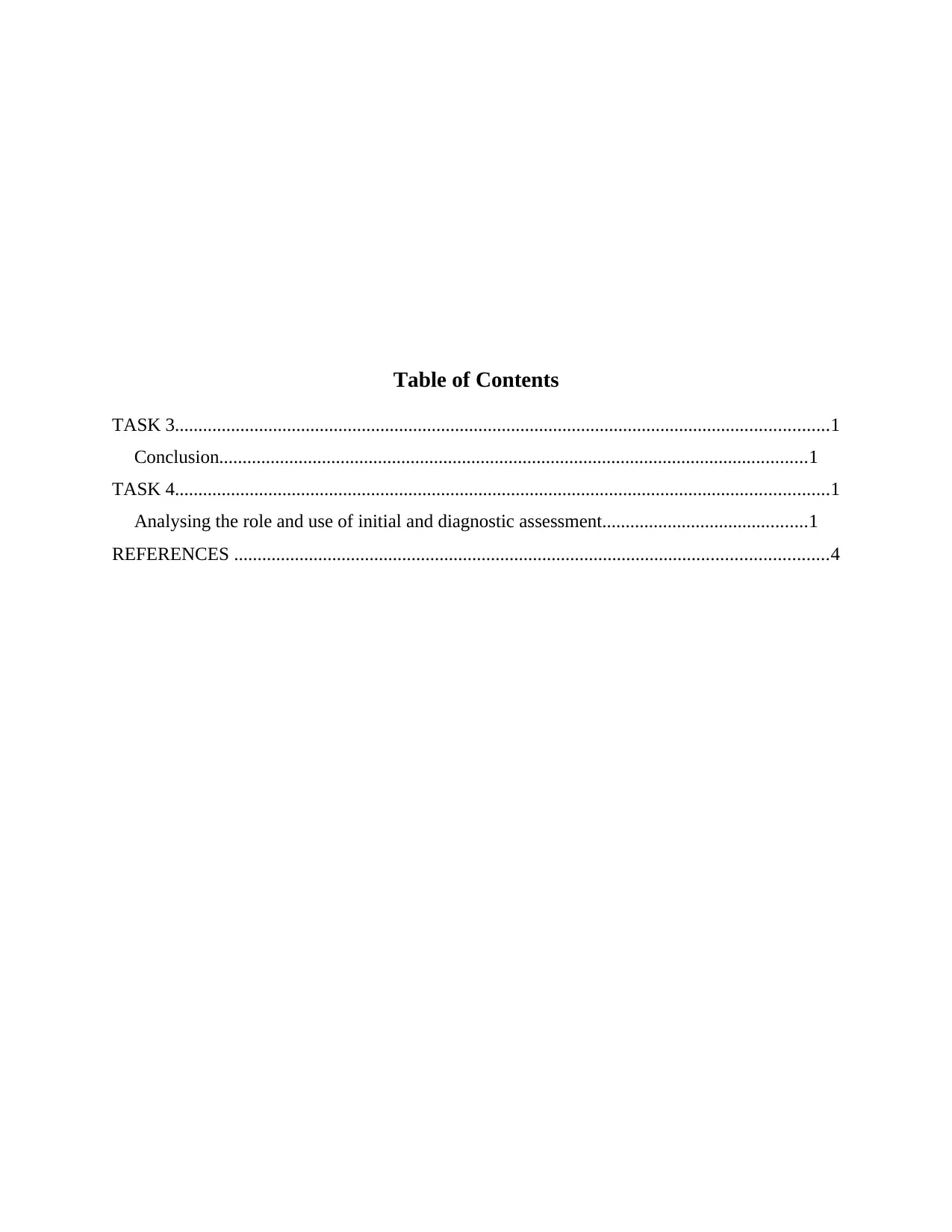
Table of Contents
TASK 3............................................................................................................................................1
Conclusion..............................................................................................................................1
TASK 4............................................................................................................................................1
Analysing the role and use of initial and diagnostic assessment............................................1
REFERENCES ...............................................................................................................................4
TASK 3............................................................................................................................................1
Conclusion..............................................................................................................................1
TASK 4............................................................................................................................................1
Analysing the role and use of initial and diagnostic assessment............................................1
REFERENCES ...............................................................................................................................4

⊘ This is a preview!⊘
Do you want full access?
Subscribe today to unlock all pages.

Trusted by 1+ million students worldwide
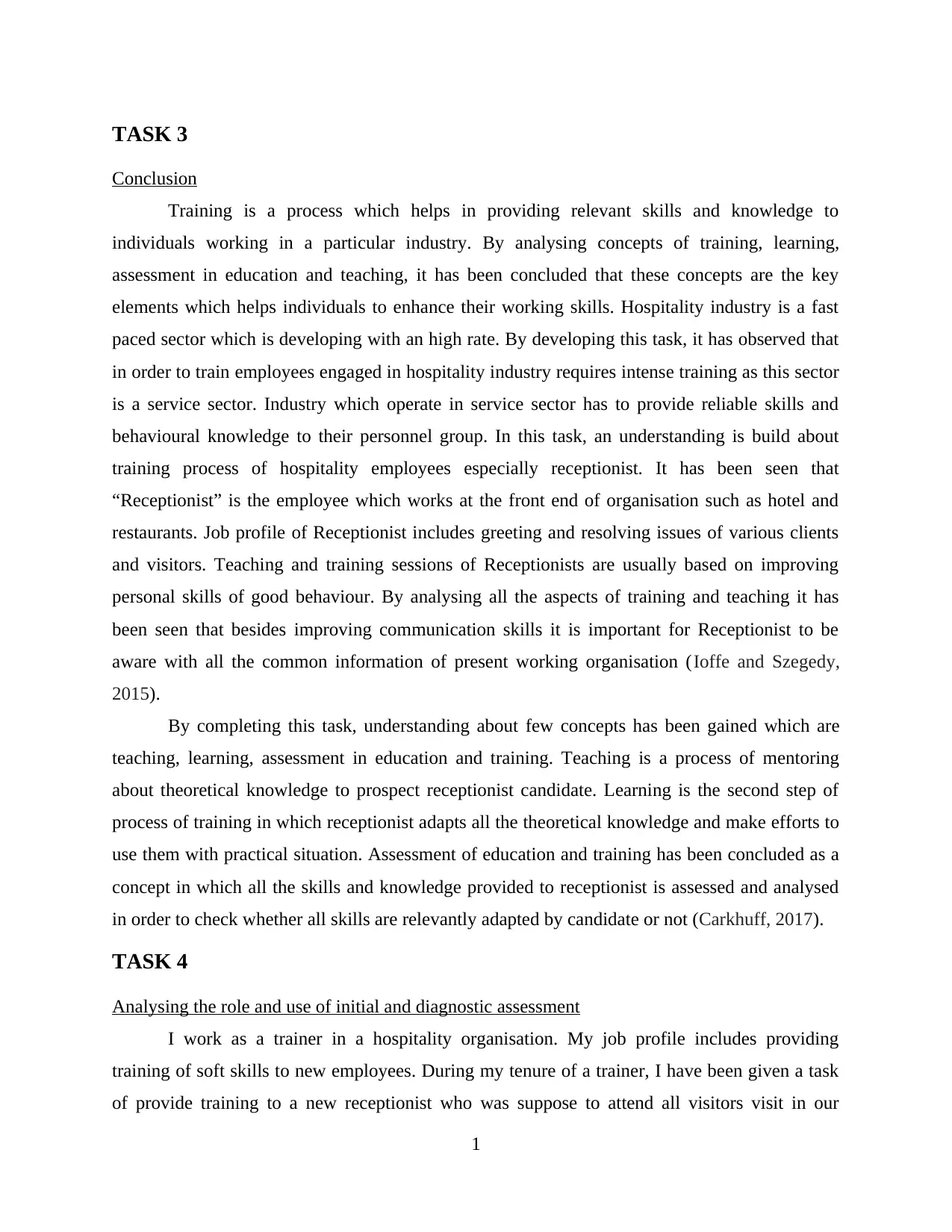
TASK 3
Conclusion
Training is a process which helps in providing relevant skills and knowledge to
individuals working in a particular industry. By analysing concepts of training, learning,
assessment in education and teaching, it has been concluded that these concepts are the key
elements which helps individuals to enhance their working skills. Hospitality industry is a fast
paced sector which is developing with an high rate. By developing this task, it has observed that
in order to train employees engaged in hospitality industry requires intense training as this sector
is a service sector. Industry which operate in service sector has to provide reliable skills and
behavioural knowledge to their personnel group. In this task, an understanding is build about
training process of hospitality employees especially receptionist. It has been seen that
“Receptionist” is the employee which works at the front end of organisation such as hotel and
restaurants. Job profile of Receptionist includes greeting and resolving issues of various clients
and visitors. Teaching and training sessions of Receptionists are usually based on improving
personal skills of good behaviour. By analysing all the aspects of training and teaching it has
been seen that besides improving communication skills it is important for Receptionist to be
aware with all the common information of present working organisation (Ioffe and Szegedy,
2015).
By completing this task, understanding about few concepts has been gained which are
teaching, learning, assessment in education and training. Teaching is a process of mentoring
about theoretical knowledge to prospect receptionist candidate. Learning is the second step of
process of training in which receptionist adapts all the theoretical knowledge and make efforts to
use them with practical situation. Assessment of education and training has been concluded as a
concept in which all the skills and knowledge provided to receptionist is assessed and analysed
in order to check whether all skills are relevantly adapted by candidate or not (Carkhuff, 2017).
TASK 4
Analysing the role and use of initial and diagnostic assessment
I work as a trainer in a hospitality organisation. My job profile includes providing
training of soft skills to new employees. During my tenure of a trainer, I have been given a task
of provide training to a new receptionist who was suppose to attend all visitors visit in our
1
Conclusion
Training is a process which helps in providing relevant skills and knowledge to
individuals working in a particular industry. By analysing concepts of training, learning,
assessment in education and teaching, it has been concluded that these concepts are the key
elements which helps individuals to enhance their working skills. Hospitality industry is a fast
paced sector which is developing with an high rate. By developing this task, it has observed that
in order to train employees engaged in hospitality industry requires intense training as this sector
is a service sector. Industry which operate in service sector has to provide reliable skills and
behavioural knowledge to their personnel group. In this task, an understanding is build about
training process of hospitality employees especially receptionist. It has been seen that
“Receptionist” is the employee which works at the front end of organisation such as hotel and
restaurants. Job profile of Receptionist includes greeting and resolving issues of various clients
and visitors. Teaching and training sessions of Receptionists are usually based on improving
personal skills of good behaviour. By analysing all the aspects of training and teaching it has
been seen that besides improving communication skills it is important for Receptionist to be
aware with all the common information of present working organisation (Ioffe and Szegedy,
2015).
By completing this task, understanding about few concepts has been gained which are
teaching, learning, assessment in education and training. Teaching is a process of mentoring
about theoretical knowledge to prospect receptionist candidate. Learning is the second step of
process of training in which receptionist adapts all the theoretical knowledge and make efforts to
use them with practical situation. Assessment of education and training has been concluded as a
concept in which all the skills and knowledge provided to receptionist is assessed and analysed
in order to check whether all skills are relevantly adapted by candidate or not (Carkhuff, 2017).
TASK 4
Analysing the role and use of initial and diagnostic assessment
I work as a trainer in a hospitality organisation. My job profile includes providing
training of soft skills to new employees. During my tenure of a trainer, I have been given a task
of provide training to a new receptionist who was suppose to attend all visitors visit in our
1
Paraphrase This Document
Need a fresh take? Get an instant paraphrase of this document with our AI Paraphraser
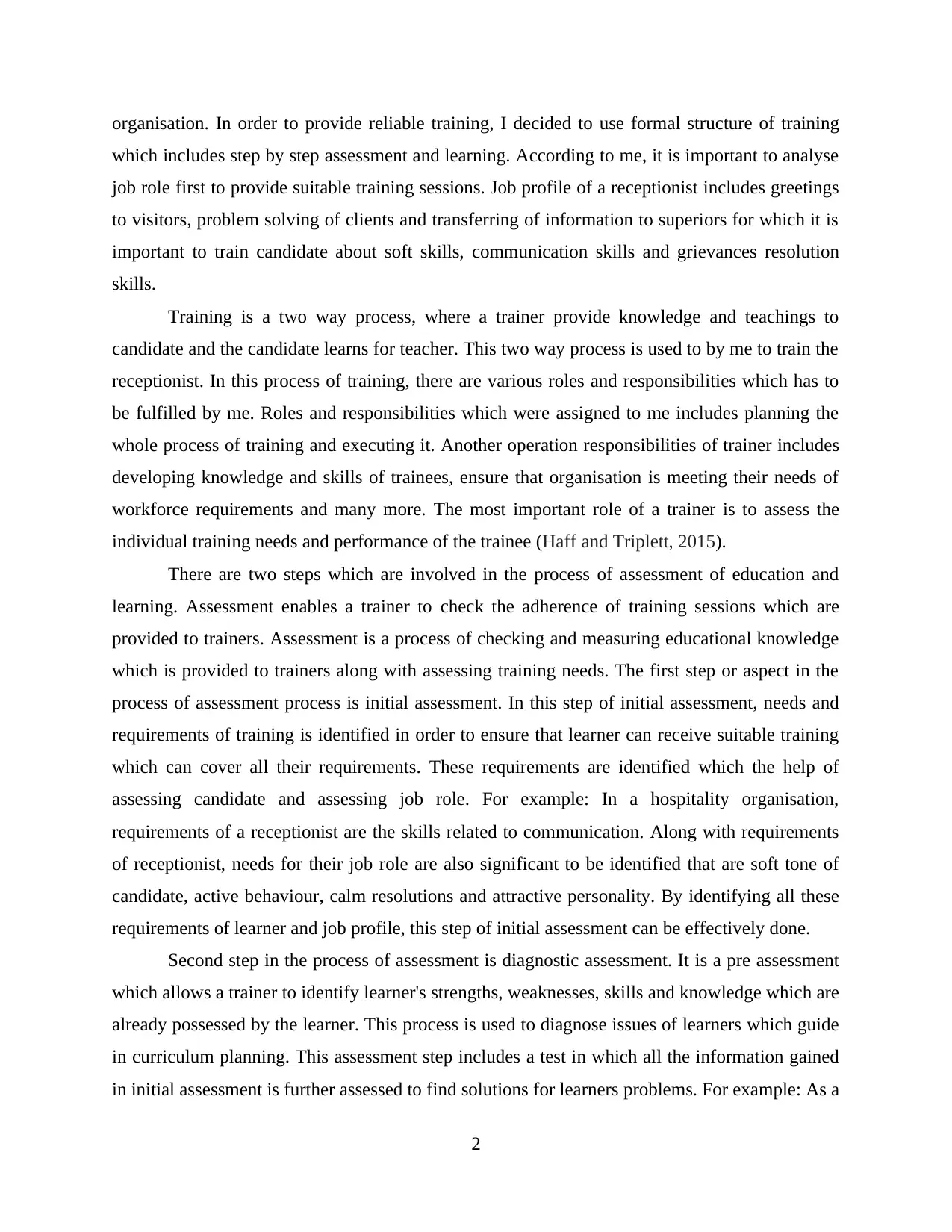
organisation. In order to provide reliable training, I decided to use formal structure of training
which includes step by step assessment and learning. According to me, it is important to analyse
job role first to provide suitable training sessions. Job profile of a receptionist includes greetings
to visitors, problem solving of clients and transferring of information to superiors for which it is
important to train candidate about soft skills, communication skills and grievances resolution
skills.
Training is a two way process, where a trainer provide knowledge and teachings to
candidate and the candidate learns for teacher. This two way process is used to by me to train the
receptionist. In this process of training, there are various roles and responsibilities which has to
be fulfilled by me. Roles and responsibilities which were assigned to me includes planning the
whole process of training and executing it. Another operation responsibilities of trainer includes
developing knowledge and skills of trainees, ensure that organisation is meeting their needs of
workforce requirements and many more. The most important role of a trainer is to assess the
individual training needs and performance of the trainee (Haff and Triplett, 2015).
There are two steps which are involved in the process of assessment of education and
learning. Assessment enables a trainer to check the adherence of training sessions which are
provided to trainers. Assessment is a process of checking and measuring educational knowledge
which is provided to trainers along with assessing training needs. The first step or aspect in the
process of assessment process is initial assessment. In this step of initial assessment, needs and
requirements of training is identified in order to ensure that learner can receive suitable training
which can cover all their requirements. These requirements are identified which the help of
assessing candidate and assessing job role. For example: In a hospitality organisation,
requirements of a receptionist are the skills related to communication. Along with requirements
of receptionist, needs for their job role are also significant to be identified that are soft tone of
candidate, active behaviour, calm resolutions and attractive personality. By identifying all these
requirements of learner and job profile, this step of initial assessment can be effectively done.
Second step in the process of assessment is diagnostic assessment. It is a pre assessment
which allows a trainer to identify learner's strengths, weaknesses, skills and knowledge which are
already possessed by the learner. This process is used to diagnose issues of learners which guide
in curriculum planning. This assessment step includes a test in which all the information gained
in initial assessment is further assessed to find solutions for learners problems. For example: As a
2
which includes step by step assessment and learning. According to me, it is important to analyse
job role first to provide suitable training sessions. Job profile of a receptionist includes greetings
to visitors, problem solving of clients and transferring of information to superiors for which it is
important to train candidate about soft skills, communication skills and grievances resolution
skills.
Training is a two way process, where a trainer provide knowledge and teachings to
candidate and the candidate learns for teacher. This two way process is used to by me to train the
receptionist. In this process of training, there are various roles and responsibilities which has to
be fulfilled by me. Roles and responsibilities which were assigned to me includes planning the
whole process of training and executing it. Another operation responsibilities of trainer includes
developing knowledge and skills of trainees, ensure that organisation is meeting their needs of
workforce requirements and many more. The most important role of a trainer is to assess the
individual training needs and performance of the trainee (Haff and Triplett, 2015).
There are two steps which are involved in the process of assessment of education and
learning. Assessment enables a trainer to check the adherence of training sessions which are
provided to trainers. Assessment is a process of checking and measuring educational knowledge
which is provided to trainers along with assessing training needs. The first step or aspect in the
process of assessment process is initial assessment. In this step of initial assessment, needs and
requirements of training is identified in order to ensure that learner can receive suitable training
which can cover all their requirements. These requirements are identified which the help of
assessing candidate and assessing job role. For example: In a hospitality organisation,
requirements of a receptionist are the skills related to communication. Along with requirements
of receptionist, needs for their job role are also significant to be identified that are soft tone of
candidate, active behaviour, calm resolutions and attractive personality. By identifying all these
requirements of learner and job profile, this step of initial assessment can be effectively done.
Second step in the process of assessment is diagnostic assessment. It is a pre assessment
which allows a trainer to identify learner's strengths, weaknesses, skills and knowledge which are
already possessed by the learner. This process is used to diagnose issues of learners which guide
in curriculum planning. This assessment step includes a test in which all the information gained
in initial assessment is further assessed to find solutions for learners problems. For example: As a
2
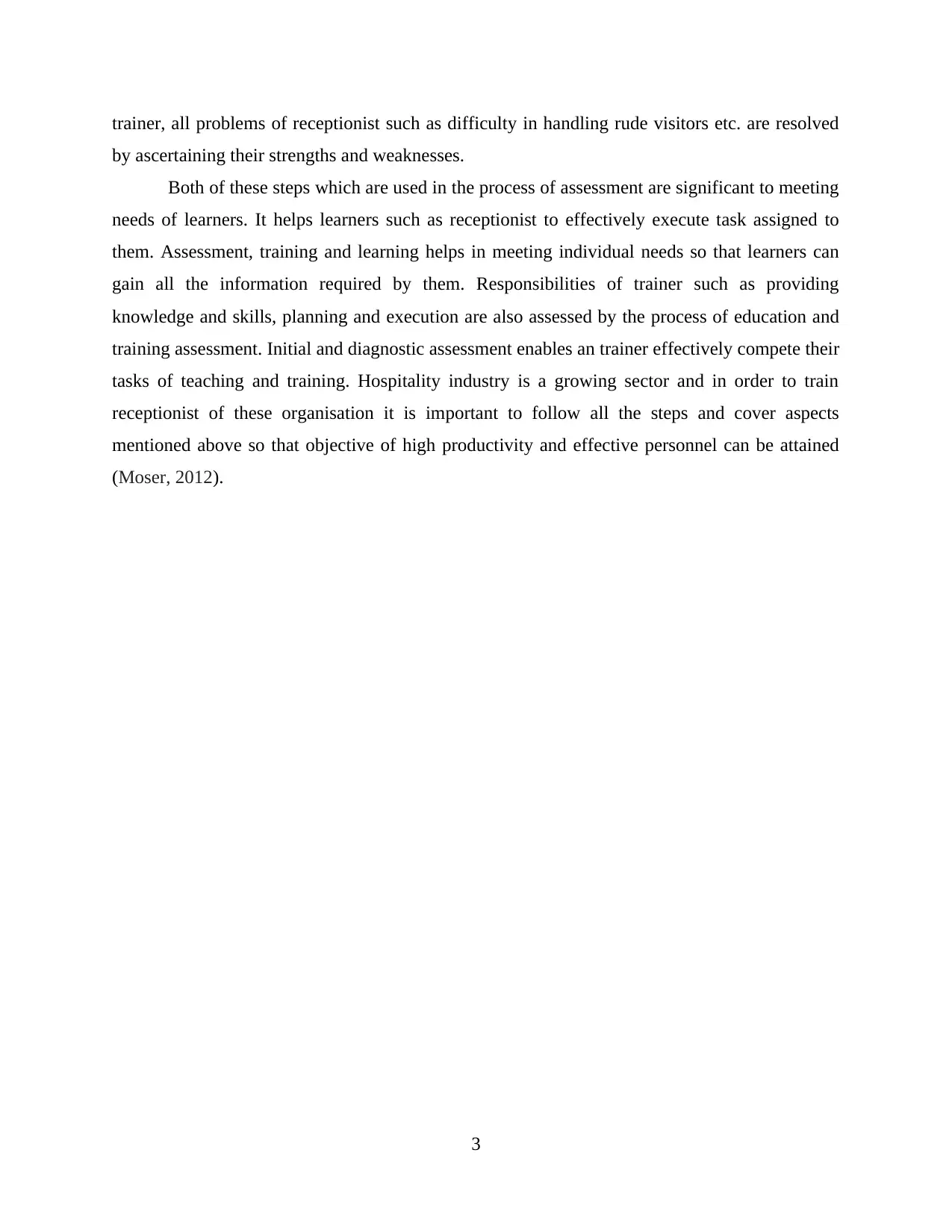
trainer, all problems of receptionist such as difficulty in handling rude visitors etc. are resolved
by ascertaining their strengths and weaknesses.
Both of these steps which are used in the process of assessment are significant to meeting
needs of learners. It helps learners such as receptionist to effectively execute task assigned to
them. Assessment, training and learning helps in meeting individual needs so that learners can
gain all the information required by them. Responsibilities of trainer such as providing
knowledge and skills, planning and execution are also assessed by the process of education and
training assessment. Initial and diagnostic assessment enables an trainer effectively compete their
tasks of teaching and training. Hospitality industry is a growing sector and in order to train
receptionist of these organisation it is important to follow all the steps and cover aspects
mentioned above so that objective of high productivity and effective personnel can be attained
(Moser, 2012).
3
by ascertaining their strengths and weaknesses.
Both of these steps which are used in the process of assessment are significant to meeting
needs of learners. It helps learners such as receptionist to effectively execute task assigned to
them. Assessment, training and learning helps in meeting individual needs so that learners can
gain all the information required by them. Responsibilities of trainer such as providing
knowledge and skills, planning and execution are also assessed by the process of education and
training assessment. Initial and diagnostic assessment enables an trainer effectively compete their
tasks of teaching and training. Hospitality industry is a growing sector and in order to train
receptionist of these organisation it is important to follow all the steps and cover aspects
mentioned above so that objective of high productivity and effective personnel can be attained
(Moser, 2012).
3
⊘ This is a preview!⊘
Do you want full access?
Subscribe today to unlock all pages.

Trusted by 1+ million students worldwide
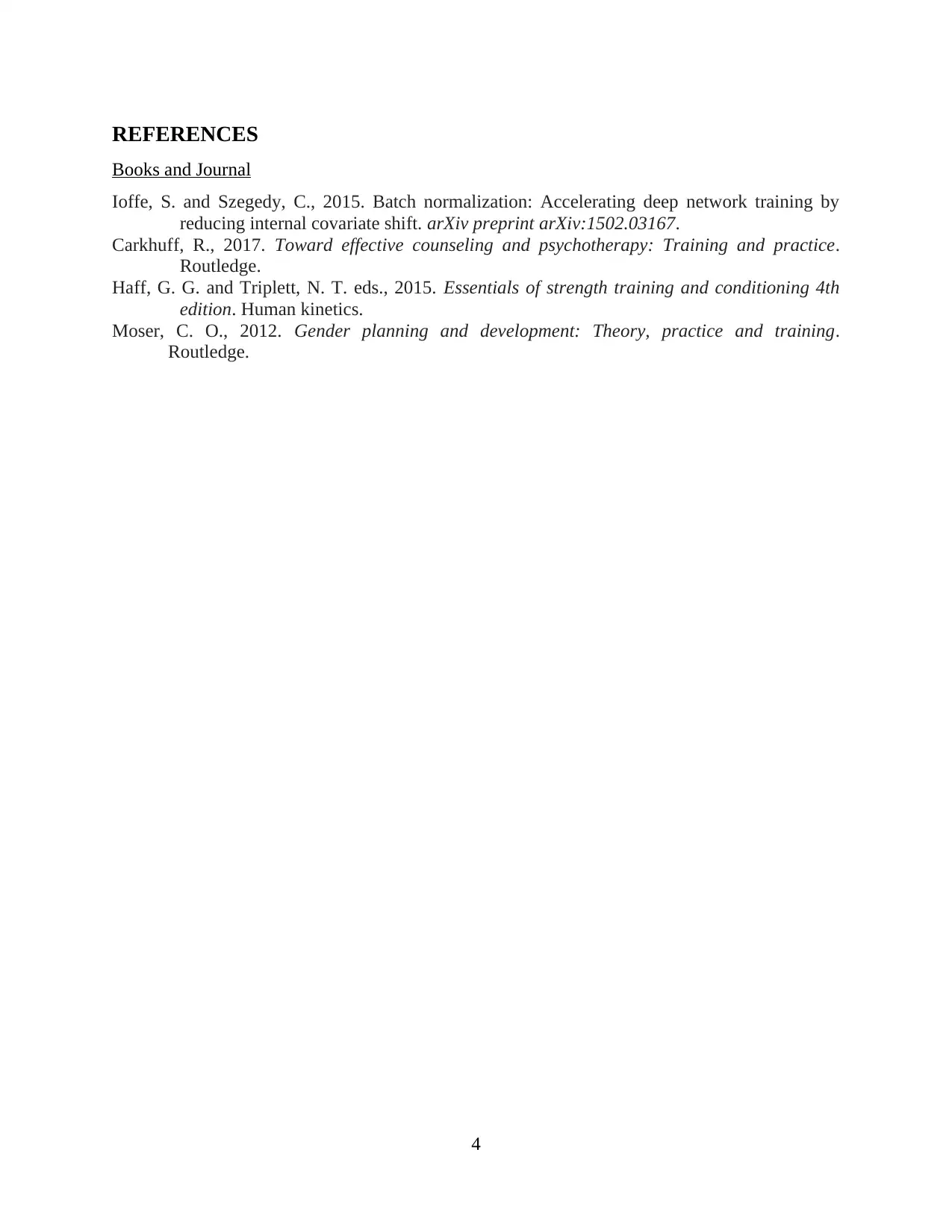
REFERENCES
Books and Journal
Ioffe, S. and Szegedy, C., 2015. Batch normalization: Accelerating deep network training by
reducing internal covariate shift. arXiv preprint arXiv:1502.03167.
Carkhuff, R., 2017. Toward effective counseling and psychotherapy: Training and practice.
Routledge.
Haff, G. G. and Triplett, N. T. eds., 2015. Essentials of strength training and conditioning 4th
edition. Human kinetics.
Moser, C. O., 2012. Gender planning and development: Theory, practice and training.
Routledge.
4
Books and Journal
Ioffe, S. and Szegedy, C., 2015. Batch normalization: Accelerating deep network training by
reducing internal covariate shift. arXiv preprint arXiv:1502.03167.
Carkhuff, R., 2017. Toward effective counseling and psychotherapy: Training and practice.
Routledge.
Haff, G. G. and Triplett, N. T. eds., 2015. Essentials of strength training and conditioning 4th
edition. Human kinetics.
Moser, C. O., 2012. Gender planning and development: Theory, practice and training.
Routledge.
4
1 out of 7
Related Documents
Your All-in-One AI-Powered Toolkit for Academic Success.
+13062052269
info@desklib.com
Available 24*7 on WhatsApp / Email
![[object Object]](/_next/static/media/star-bottom.7253800d.svg)
Unlock your academic potential
Copyright © 2020–2026 A2Z Services. All Rights Reserved. Developed and managed by ZUCOL.



